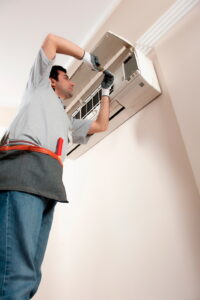What happens if you lose your gas line? What relationship does that simple copper pipe have to the comfort control of your home? It depends largely on the scope of your HVAC system and what time of the year you lose gas, but the answer is almost always that it will have a pretty big impact.
What Uses Gas in Your Home?
There are a number of components that use gas in your home. The first and most common is your furnace, but you will find that your water heater may also use a gas line and some packaged air conditioning systems use gas for heating components.
- Heating – If you have a gas line, it’s very likely that your heating system uses gas as an energy source. It’s the least expensive of the three major energy sources (oil, gas and electricity) and gas furnaces and boilers are extremely efficient. In terms of how much gas you will use, one cubic foot of gas contains 1040 BTUs of heating energy per hour.So, if your furnace offers 100,000 BTUs of heating capacity, it would use 96.15 cubic feet of natural gas when running at full capacity. Keep in mind, though, that a gas furnace is rated with an AFUE rating. This is the percentage of the fuel consumed that is actually converted to heat. So, if your AFUE rating is 90%, your actual BTU production would be 90,000 for the same 96.15 cubic feet of gas. The cost of natural gas varies by location, but is generally around $1 per cubic foot.Boilers are very similar in their gas consumption rates. Boilers are rated for maximum output – so if you have a 15kW boiler – meaning it will burn the equivalent of 15 kWh of gas per hour when running at full capacity. Keep in mind that this is the maximum output. If you only have one radiator open, the actual rate may be much lower.
- Water Heating – For a water heater, gas rates are charged by kWh, just like your boiler. The total is usually significantly less than for a boiler, but the same mechanics apply. Your water heater should have a placard or sheet that lists its maximum production per hour so you can determine how much gas it uses per hour when your hot water is in high demand.
Gas is a highly volatile substance and while there are a number of safety measures implemented in your home to protect your family, it’s important to ensure the gas lines are well maintained. Annual maintenance is a must to keep the gas working properly. If you do notice a leak or sudden loss of gas, don’t call a contractor – call the gas company immediately as it could be an emergency.
Continue Reading
Tags: Salt Lake City, SLC, Utah
Posted in Air Conditioning, Salt Lake City Air Conditioning | Comments Off on Your HVAC System and the Gas Line



